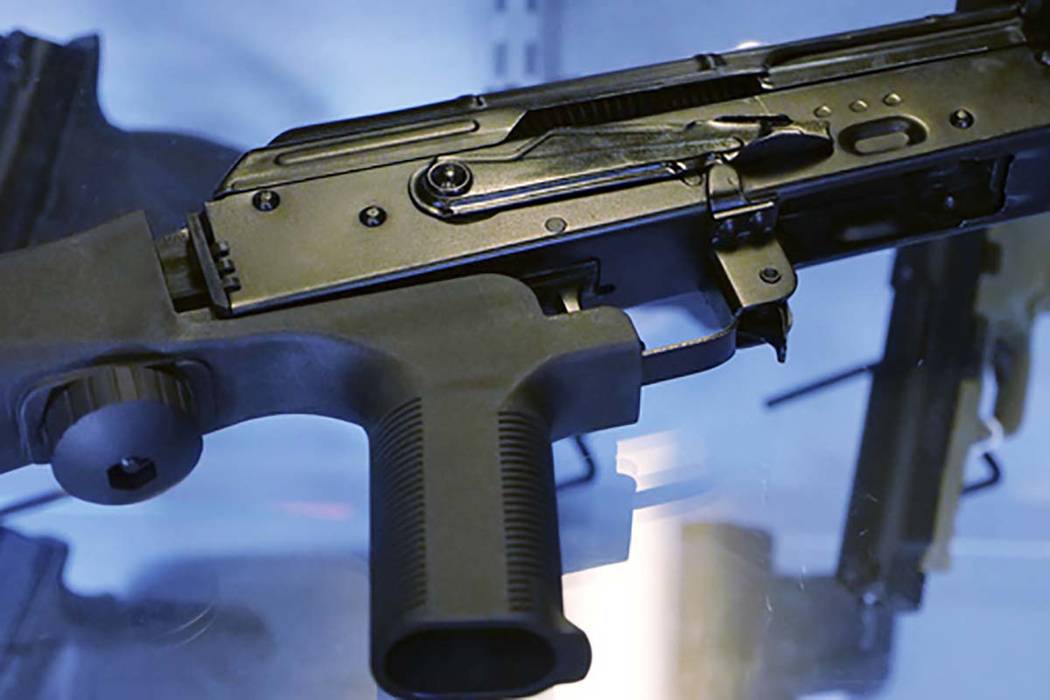Bump stock ban to take effect in 90 days

WASHINGTON — The long road to banning bump stocks in the wake of the Oct. 1, 2017, mass shooting will come to an end in 90 days when a final rule drafted by the Department of Justice takes effect, the Las Vegas Review-Journal has learned.
Acting Attorney General Matthew Whitaker signed the 157-page document Tuesday morning. The rule is expected to take effect March 21.
White House press secretary Sarah Sanders said Tuesday that the final rule makes it clear “that bump stocks are illegal because they fall within the definition of machine guns that are banned under federal firearms law.”
The devices, which accelerate the rate of fire of semi-automatic weapons and thus enabled a lone shooter in a high-rise hotel suite to kill 58 people on the ground and wound hundreds more, will be defined as “machine guns.” Possession of the devices will become a felony.
“While the administration’s decision to ban these deadly devices is long overdue, it’s a step in the right direction,” said Rep. Jacky Rosen, D-Nev.
But Rosen and others on both sides of the gun control debate criticized the Trump administration for pushing a regulation instead of working with Congress to enact a law.
Rep. Dina Titus, D-Nev., slammed President Donald Trump for being “more interested in making headlines than making progress.”
Titus argued that the new rule “will likely be tied up in the courts,” whereas a statute passed by Congress would be harder to challenge in the courtroom.
Titus garnered some Republican support for her “Closing the Bump Stock Loophole” Act, but she argued that the GOP leadership blocked the measure from advancing to a floor vote.
David Chipman, a former agent with the Bureau of Alcohol, Tobacco, Firearms and Explosives and a senior adviser to the Giffords gun control organization, agreed with Titus.
“The new rule only keeps the door open for prolonged judicial disputes — leaving these harmful devices in the market,” Chipman said in a statement. “This action won’t bring the progress we need — that will take an act of Congress.”
Erich Pratt of Gun Owners of America also agreed that only Congress could change the law.
“ATF’s claim that it can rewrite congressional law cannot pass legal muster,” Pratt said in a statement. “Agencies are not free to rewrite laws under the guise of ‘interpretation’ of a statute, especially where the law’s meaning is clear.”
The 157-page rule reviewed the history of bump stock regulation. In 2006, the ATF concluded the devices qualified as machine guns under the National Firearms Act of 1934 and the Gun Control Act of 1968.
But between 2008 and 2017, the ATF found the devices were not machine guns because they did not rely on internal parts.
Most notably in 2010, the ATF determined it was legal to possess bump-stock devices. Chipman and others fear that ruling could be used to invalidate the new rule.
Owners will have 90 days to destroy their bump stocks or turn them into the ATF. Owners also can contact local law enforcement offices to see if they would be willing to accept the devices.
According to a Justice Department official, federal agents “have no plans to go door to door” to ensure compliance.
“Most firearms owners are law-abiding citizens,” said the official, adding that the Justice Department anticipates compliance. “We will investigate on a case-by-case basis.”
No compensation will be given for the bump stocks. Owners will not be allowed to register the devices.
Even before Trump announced his support for a ban in the wake of the Route 91 Harvest festival shooting, the National Rifle Association had departed from its usual opposition to any new gun regulations.
But on Tuesday, NRA spokeswoman Jennifer Baker criticized the new rule for failing to “provide amnesty” for “the thousands of law-abiding Americans who relied on prior ATF determinations when lawfully acquiring these devices.”
In February, Trump met with a bipartisan group of lawmakers to urge them to pass a comprehensive school safety bill in the wake of a deadly shooting at a Parkland, Florida, high school.
At the meeting, Trump said he supported a ban on bump stocks, but he added that Congress would not have to pass legislation, because “we can do that with an executive order.”
Trump directed then-Attorney General Jeff Sessions to propose “a rule banning all devices that turn legal weapons into machine guns” and to do so “as expeditiously as possible.”
That order set off the rulemaking process, followed by the submission and review of public comments. The Department of Justice received more than 186,000 comments; more than 119,000 supported the new rule, while more than 66,000 opposed a ban.
Whitaker said the ban was in keeping with Trump’s law-and-order emphasis by “making clear that bump stocks, which turn semi-automatics into machine guns, are illegal, and we will continue to take illegal guns off our streets.”
Contact Debra J. Saunders at dsaunders@reviewjournal.com or 202-662-7391. Follow @DebraJSaunders on Twitter.
Department of Justice Final Rule on Bump Stocks by Las Vegas Review-Journal on Scribd